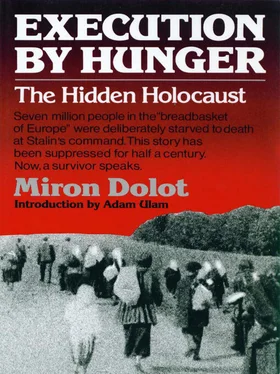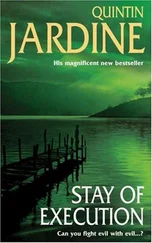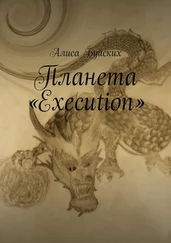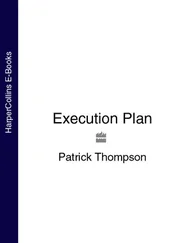At times, those officials exhibited a sort of childish behavior that flabbergasted us. Often they would entertain themselves by playing with their guns. Sometimes they fought duels in jest. That was how we learned that all of them carried guns. On their daily rounds, they sometimes shot at anything that moved. Occasionally, they even went so far as to stage mock executions of one or another of the villagers.
I witnessed the following scene: a neighbor of ours could not deliver the required quota of grain. Comrade Thousander, the head of the commission, decided to “teach” him how to obey orders. He announced that our neighbor would be shot for “opposing the Party’s policies.” The execution was to take place immediately in the garden behind the man’s house. No doubt Comrade Thousander was expecting our neighbor to plead for mercy and promise to deliver the grain quota. The commission members suspected that he had “hidden grain” somewhere. But, our neighbor could not be so easily frightened.
“As you wish,” he quietly announced to the surprised officials. “I am ready; let’s get it over with.” And he led the way into the garden. Then he was blindfolded and asked for the last time whether he was willing to deliver the grain quota. His answer was that he had nothing to deliver. Comrade Thousander raised his gun and fired—over our neighbor’s head. Then the blindfold was removed, and our neighbor was asked the same question. The answer was still the same. The blindfold was put on once more: the bullets flew over his head again; but he would not change his story. By now, the officials’ laughter had changed to rage. Not being able to accomplish anything at the time, they left, promising to return and give him a “real lesson.”
What had once been a “tax in kind,” then a “bread collection for the whole state,” and later “expropriation of bread for construction of the socialist society,” now became robbery. Free of any restraints, the commission went from house to house, day and night, searching for “hidden bread.” Each commission had its experts for this purpose. The experts responsible for searching for grain in the ground were equipped with special screw-type rods. The long rods sharpened at one end were used for probing haystacks or tacks of straw, and the thatched roofs of the farmers’ houses. The commission members searched everywhere: they drilled holes in the gardens, backyards, in the earth floors of the houses, and in the farm buildings. They looked for grain under beds, in the lattices and cellars. They never missed checking inside the stoves and ovens, on and under shelves, in trunks, and up the chimneys. They measured the thickness of the walls, and inspected them for bulges where grain could have been concealed. Sometimes they completely tore down suspicious walls or took apart or demolished cooking and heating stoves and ovens. Nothing in the houses remained intact or untouched. They upturned everything: even the cribs of babies, and the babies themselves were thoroughly frisked, not to mention the other family members. They looked for “hidden grain” in and under men’s and women’s clothing. Even the smallest amount that was found was confiscated. If so much as a small can or jar of seeds was found that had been set aside for spring planting, it was taken away, and the owner was accused of hiding food from the state.
One day, the commission came to our house leading a horse with them. Why? we wondered. The horse searched for grain in the ground. The “search expert” led it all around our backyard. At first, we couldn’t figure out the reason for this ceremony. Later we found out that a horse presumably would not step on a covered pit; it would abruptly stop before it, or jump over it. That would be a signal for the commission to grab their shovels and start digging for hidden grain. Fortunately, we had no covered pits.
As 1932 neared its end, we often heard explanations of why the officials continued searching our homes for grain. They were very simple: since we were still alive, we must have been eating something to survive. We had not fulfilled the grain delivery quota, and yet we had been complaining that we had nothing to eat. But we were still alive! That meant that we had to have food—but where? It had to be somewhere. The officials felt that they had failed in their duties to find the hidden treasure of food. This made them frustrated, angry, and all the more vicious and cruel to us.
We were being watched day and night. We were cautioned, for example, that the village windmills were being closely scrutinized. Those who wound bring some grain to the windmill for converting it into flour could be sure that they would be visited by the commission even before they returned home. But such cases were very rare because we had no grain at that time. The village windmills stood idle.
Aside from wheat and rye, other cereals such as millet and buckwheat were also staples of the Ukrainian diet. To prepare the millet or buckwheat grain for cooking every household had its own mortar, a simply-designed wooden contraption that separated the grain from the husk. One day, sometime at the end of November 1932, it was announced that all mortars had to be destroyed on the explicit order of Comrade Thousander. The following days witnessed the senseless destruction of this device. Members of the commission, armed with axes, went from house to house, hacking the mortars to pieces without giving us an explanation of why it had to be done. Those of us who still had some millet or buckwheat grain had to find some other way to remove the husks.
Smoke curling from the chimney could also cause trouble for a household, as it was a reliable sign that something might be cooking inside. The officials instructed their men to carefully observe our chimneys. In our Hundred, for example, a special smoke watcher was appointed. His duty was to watch all Hundred homes day and night and to inform the Thousander about each and every house from which smoke was emitted. Especially closely watched were the houses of those villagers who were suspected of “hoarding bread.” The houses with the telltale sign of smoke would be visited by commissions without delay. If cereal was being cooked, the houseowner would be subjected to a lengthy interrogation, and a thorough search would be made. The usage of grain before the fulfillment of the quota was considered illegal, and was severely punished. Since our village had not yet fulfilled that quota, by cooking our gruel and consuming it, we “misappropriated socialist property for our personal gain.” Even the smallest amount of cereal had to be delivered to the state.
A house with smoke coming from its chimney was also in danger of becoming a target for thieves. Robbers at that time were interested only in food, cooked or raw. We often heard that terrible crimes had been committed for a couple of potatoes or a pot of buckwheat gruel.
There was also another way used to find out whether a villager had grain or other agricultural produce: that of arrest and jail. As I had mentioned before, the prisoners in the village jail did not receive food from their jailkeepers; their families had to feed them. One of the Thousanders was struck by an ingenious idea: how about throwing those suspected of “hoarding food” into jail and then wait to see what happened?
The idea was enthusiastically accepted, and soon we started hearing of arrests without any reason; arrests made just to find out what kind of food, if any, the arrested would receive from home. The trick didn’t work. There really was no food in the village. Bringing food to jail would have meant exposing the family, including the arrested family member, to obvious danger. Thus no one wanted to do that, even for the sake of one’s own father.
In November 1932, the suffering of our villagers began to approach the magnitude of last spring’s famine. The first famine had been marked by unspeakable suffering, and yet, it had not been without a ray of hope: it was spring, and we all prayed that the new vegetables and fruits would sustain us until the summer harvest. The situation this autumn, however, was different. The harvest of 1932 was good, but the government took everything. The collective farmers were left without bread, except for that meager payment in kind that they received as advance compensation for their work. By the end of November, we were at the end of our resources. We were without food, and we had no money with which to buy any. The dried and preserved wild berries, the edible roots, the cabbages and pumpkins, the beets, the fruits had already been consumed. There was no hope of getting a new supply of them. We faced a severe winter with freezing temperatures, and great snowstorms which we knew would last until the end of March or even longer. Again, as in last spring’s famine, a multitude of beggars roamed the village, pleading to be rescued from death. They begged for morsels of bread, for scraps of food, for peelings and discards. Once again, one could see famished people, dressed in rags and tatters, roaming over the potato field searching for leftover potatoes. Once more, starving farmers, like walking skeletons, searched the forest and explored the river with the hopes of finding something edible. And again, they went to cities, railroad stations, and the railroad tracks, in hope of getting some food from the passengers.
Читать дальше












